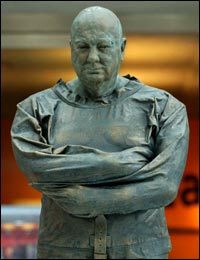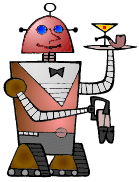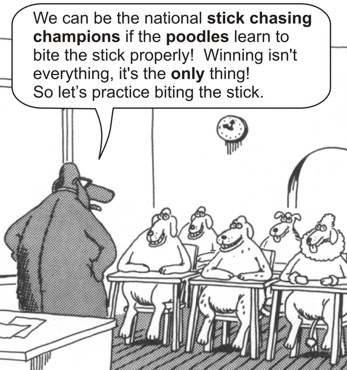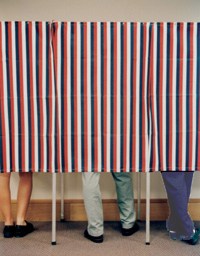Government leaders should be employees
When you hire a gardener, plumber, car mechanic, or dentist,
you don't stand up when they enter the room, applaud them every time they
do something, and treat them as if they are royalty. Instead, you treat
them as people
doing a job. If they
do a nice job, you might praise them, and if they do a lousy job you will
avoid hiring them again.
By comparison, government officials are still being treated as if they
are kings and queens. People stand up and applaud when the president enters
a room. When the president gives a speech, the audience will applaud after
every few sentences. When the president is finished with a speech, the
audience applauds once again. The applause is given regardless
of whether he said something intelligent. People will applaud him even
if he lies about the September 11 attack, and even if they realize
he is lying, and even if they are upset that he is lying.
Humans have the same emotion that we find in the animals; specifically,
we treat the dominant male as the leader simply because he is in a leadership
position. Animals never question the performance or abilities of their
leader. There are occasional challenges to his position, but animals follow
their leader simply because he is the leader.
This emotion works for animals because they are incapable of intelligent
thought, but it is creating extreme problems for humans today. This emotion
causes us to give obedience to whoever
happens to be in a leadership position, even if
he is mentally ill.
Our leaders should be treated the same as plumbers, assembly line workers,
farm workers, sales clerks, and engineers. Specifically, our leaders should
be regarded as people who are doing a job, and if they cannot do their
job properly, they must be told to find a different job.
We should not defend our leaders
Compare the difference between the way people treat government
officials to the way they treat a waiter at a restaurant. When a waiter
shows any sort of imperfection, the typical person gets angry at the waiter,
and some people will punish the waiter with snide remarks or by refusing
to leave a tip.
By comparison, when government officials waste tax money, start wars,
create economic chaos, or get caught committing crimes, millions of voters
will defend them and make excuses for them.
| During the months following the September 11 attack, when we tried
to explain to people that the government was lying about the attack, and
that the buildings were blown up with explosives, most Republicans would
behave like a horde of termites who were protecting their helpless
queen. Rather than look at the evidence we provided, they would
attack us as Bush bashers, unpatriotic, liberal extremists, conspiracy
nuts, and terrorist sympathizers. |
|
 |
| The same thing happened when we pointed out that Israelis were involved
in the demolition of the World Trade Center buildings and other aspects
of the 9/11 attack; specifically, many people – some of whom were not Jewish
– behaved as if we were attacking a nest of Jewish
larvae. Rather than look at our evidence, they would retaliate
with accusations that we were "anti-Semites", Nazis, or "towel-head lovers". |
|
 |
Criticism of a government official is not
an attack on the people of the nation, and it is not unpatriotic. Criticism
of a Jewish television executive for lying to us about the 9/11 attack
is not anti-Semitism or anti-television. People in leadership positions,
whether it be government, business, media, or schools, should be treated
the same as waiters and other employees. This animal-like behavior of defending
our leaders must stop. Our leaders
should be considered as employees who are doing a job.
If a person is truly intelligent and competent, he will be able to defend
himself. A real leader does not need a horde of human termites
to make excuses for him or defend him. Instead, a real leader tells other
people, "You stay here, I will deal with this problem."
We must be able to analyze and criticize people in leadership positions.
It is more important to be concerned about the performance of government
officials than the performance of a waiter, a dentist, or a pilot. Government
officials directly affect the lives and the future of millions of people
around the world, whereas a waiter affects only a small number of people
in a trivial manner.
Applause
should be forbidden
Nobody applauds a dentist, sales clerk, engineer, or carpenter
for doing his job properly, and nobody should applaud a government official
for behaving as a government official is supposed to behave. When a government
official does something useful or says something intelligent, the reaction
from the rest of society should be, "Well, it's nice to see that he is
doing his job properly."
When a government official says something stupid, the reaction from
the audience should be, "Is this the first time he has displayed such stupidity?
We better take a look at his performance and decide if we want to keep
him in a position of importance."
This concept might be easier to understand if you imagine what would
happen to society if we treated plumbers in the same manner as we treat
the president:
| Imagine that you call a plumber to fix a leaky pipe in your basement.
The plumber arrives at your home in a military motorcade or helicopter.
A group of soldiers roll out a red carpet and salute the plumber as he
walks to your front door. As the plumber enters your house, you and your
family stand up and applaud.
 Every
time the plumber does something, such as remove a pipe, or tighten a screw,
your family applauds him. Imagine that you applaud him regardless
of whether he does his job properly. Every
time the plumber does something, such as remove a pipe, or tighten a screw,
your family applauds him. Imagine that you applaud him regardless
of whether he does his job properly.
When he is finished with his job, you once again stand and applaud him
as he walks out of your house. Imagine that this applause is given even
if he did not fix the leak, and even
if he made the problem worse. |
| What would happen to society if plumbers were treated as royalty?
One effect would be that a lot of neurotic
people would fantasize about becoming a Plumber
King.
However, those neurotic people would not be interested in fixing plumbing
problems; rather, they would be attracted to the pampering. |
 |

You can see this effect with the entertainment business. Entertainers
are provided with phenomenal amounts of money and fame. The Los Angeles
area supposedly has thousands of people
struggling desperately to become famous entertainers. However, they are
not interested in singing, dancing, or acting. Rather, they are obsessed
with fame and money.
Imagine a world in which entertainers are paid ordinary
amounts of money for their work, and are not
given royalties every time a person plays one of their songs or watches
one of their movies. Imagine that Madonna, Tom Cruise, Michael Moore, and
Jerry Seinfeld must work about the same number of hours that everybody
else works, and that all they get in return is ordinary
wages. In such a case, they would have to live in ordinary neighborhoods
around ordinary people. Who would want to be a musician or an actor if
they had to work on a routine basis for an ordinary income? Obviously,
only the people who are truly interested in such a profession.

When we treat government officials as royalty, a lot of neurotic
people will be attracted to government jobs. They will fantasize about
the helicopter rides, the red carpets, and the crowds of people who applaud
them. They will
not fantasize about
the job, the responsibility, or the work.
If we take away the pampering and worshiping of government officials,
then a government leader becomes just another employee, and it becomes
more obvious that he actually has a difficult job and a lot of responsibility.
Without the special pampering, a government leader is similar to a manager
of an assembly line, or a research director at Union Carbide, or a supervisor
of a construction crew. Who wants those
jobs? They are a lot of work and responsibility, and they require a lot
of experience and knowledge.
There are lots of children fantasizing about being president of the
United States, or prime minister of Britain, but how many children are
fantasizing about being the manager of a microprocessor assembly line?
Did Ronald Reagan ever fantasize about becoming president of Sony or Krupps?
Did Bill Clinton ever fantasize about becoming director of research at
General Electric's aircraft engine division?
Most of the people who fantasize about becoming government leaders have
no interest in helping the human race deal with its problems. Rather, they
are attracted to the pampering, the money, and the feelings of importance.
It doesn't even appear as if the president of America does any work.
He is always visiting somebody, sitting in front of a fireplace, having
a vacation, or having dinner. When does he actually do some real
work? If the manager of a Rolls-Royce jet engine assembly line
was always seen in front of fireplaces, having vacations, and having dinner,
a lot of neurotic people would fantasize about having his
job.
In order to improve government, we must treat government officials as
employees, just as we treat sales clerks, farm workers, and engineers.
This requires getting rid of this animal-like attitude of bowing in submission
before government officials.
We must also forbid government officials from glorifying themselves,
such as by putting their photos in government buildings, or creating statues
of themselves. Photos of employees can be useful to help people identify
the employees, but we don't need photos of top government officials scattered
around the nation. Those photos are not intended to help us identify our
government officials. Rather, they are intended to allow the top leader
to
titillate himself into thinking that he is special. It's just
a another form of mental masturbation.
| This statue of Winston Churchill in a straitjacket is useful for emphasizing
the fact that he was mentally ill, but we should forbid statues
that glorify leaders.
The Mayo Clinic describes Churchill's mentall illness
as depression.
When will we give ourselves healthy leaders? |
|
 |
The political candidates who are successful in the current
voting system are the ones that make promises to reduce crime, increase
jobs, and eliminate taxes. However, it doesn't make any sense to listen
to their promises. Even a moron is
capable of devising wonderful plans.
| “If elected President, I promise to set up a committee of experts
to investigate the aging process and recommend solutions to this problem.
Read my lips: no more growing old. Vote for me and stay young
forever!” |
 |
When we select government officials, dentists, carpenters,
or airline pilots, we have to ignore their promises and look at their past
performance. Voters should be asking themselves,
"What has this person done for society so far? What has he
tried to accomplish but failed? How do his accomplishments and failures
compare to the other job candidates?"
Education and experience are irrelevant
We all learn about life as we grow older, and we all become
better at whatever job and activities we do. However, even though you have
become better at your job, that doesn't mean you're any good at it.
Perhaps the most obvious example of this is in the area of music. Some
people have spent decades learning
and practicing how to play a musical instrument, and even though they improved
through the years, they are still
crummy
as musicians. There are some young children who can play musical instruments
better than people with 40 years of experience.
Many people use their college degrees or their years of experience as
proof that their opinions are correct, or as justification to get a particular
job or promotion. Unfortunately, college degrees are only proof that a
person attended college, and "years of experience" is only proof that a
person has held a particular job for a certain number of years. Experience
means nothing. Even the losers
have lots of experience. We have to look at what people actually accomplished
during their life.
Everybody who is 60 years old has had exactly 60 years of experience
in life. However, half of them are what we would call "ordinary"; a large
percentage are "below ordinary"; and some are "retarded".
What have they accomplished?
To determine which carpenter is better, we don't compare the
number of years that they've worked as a carpenter, and we don't care whether
they have a college degree. Instead, we look at what they've
accomplished
as a carpenter. It is easy to compare carpenters because they create things
that we can see and touch, but how do we look at the performance of potential
government leaders?
Unfortunately, judging the performance of a government official requires
we figure out what their job is. Specifically,
are they submissive representatives who are supposed to give people
whatever they ask for? Or are they leaders who are supposed to make decisions
for us? There is a big difference between these two philosophies. We cannot
judge a government official performance until we decide what their job
is.
The American and British philosophy is that government officials are
submissive
representatives
of the voters. If we follow that philosophy,
then we would determine a government official's ability by looking at how
well he represented people. For example, in June 2006 Governor Matt Blunt
of Missouri signed a Holocaust education bill:
stlouis.ujcfedweb.org/content_display.html?ArticleID=186682
Has Governor Blunt performed well at representing the people
of Missouri? Not with that particular legislation! Governor Blunt was representing
a small number of Zionist Jews who
are trying to fool American children into believing the Holocaust propaganda.
If you don't know much about the Holocaust, take a look:
• Holocaust-Deniers.html
• Conspiracies12.htm
During an election, there should be discussions among the voters about
the previous achievements of the candidates. If there were such discussions,
the voters would realize that all other government officials are failures
as representatives, and they are also failures as leaders.
We must monitor their performance
on
the job
When a person is hired at a business, he is often put on a
probationary period for the first few months in order to determine if he
is any good at his job. If he turns out to be incompetent, he is told to
find another job. After he gets through his probationary period, his boss
will occasionally review his performance to make sure that he is still
doing his job properly.
There is no corresponding probationary period or performance
review for government officials. Instead, government officials
who accomplish nothing year after year
can use the excuse that the previous administration caused so much chaos
that it's going to take a long time to fix the problems.
The job of a voter doesn't stop after he finishes voting. Rather, a
voter should monitor the performance of the government officials. The officials
who don't appear to be doing well as a leader must be told to find another
job.
Voters insult
incompetent government officials rather than replace
them
Voters frequently insult their government leaders for being
incompetent and corrupt; comedians routinely make insulting jokes about
government officials; and many voters grumble about selecting the lesser
of two evils when they vote for president.
To understand how absurd this behavior
is, imagine if people treated incompetent or corrupt dentists like this.
Imagine a person routinely going to an incompetent dentist who made his
teeth worse at every visit, and the person's response was to insult
the dentist. Imagine if television comedians were making large amounts
of money by making jokes about the incompetent dentist.
What would you think if IBM hired some engineers that were incompetent,
and the reaction of the IBM executives was to insult the engineers? Would
you be impressed by the IBM management?
People who ridicule the incompetent and corrupt government officials
are incompetent voters. When they insult
their government leaders, they are actually insulting
themselves, but they don't realize it. When government officials
are doing a lousy job, they should be replaced
with somebody better.
You may respond that millions of voters wanted to replace President
Clinton after he lied about his sexual activities with Monica Lewinsky.
However, the voters were not interested in replacing Clinton with somebody
better; rather, they simply wanted to remove him, and they had no concern
that the replacement would be an improvement. Furthermore, they did not
make the decision to remove Clinton based on a review of his performance
as president. Rather, they wanted to remove him because the majority of
people are suffering from sexual disorders.
How many people would be honest about their sexual activities while
on television? If it is justifiable to remove a president for lying about
his sexual activities, wouldn't that allow virtually any government official
to be removed? And if dentists, pilots, and doctors could have their license
removed for lying about their sexual activities on television, how many
dentists, pilots, or doctors would we have?
There is no concern about whether a government official is mentally
ill, incompetent, alcoholic, taking bribes, or a puppet of an organized
crime gang. Most voters are only concerned about the sexual
activities of their leaders. However, in order to make a better
government, we must be able to remove government officials for incompetence
and corruption.
Dominant males attract females

The issue of government officials lying about their sexual
activities is especially ridiculous when you realize that female animals
are sexually attracted to the dominant male, so it is natural for the dominant
males to attract a lot of females. When a man has trouble resisting the
females, most people consider the man to be suffering from a character
flaw, but how many young men are capable of resisting? It's easy for older
men to resist women, and it's easy to resist women who don't appeal to
us, but it is difficult to resist women we are attracted to.
This behavior is natural for us,
and it developed in animals as a way of ensuring that the better males
reproduce more than the inferior males. If we were to remove every male
from a position of leadership because he could not resist the females,
who would be remaining? And how would removing those men from their positions
make our society a better place?
Furthermore, why do we blame the men
for this? Why not blame the women? Why not tell women to stop being attracted
to dominant men?
At the moment people can be blackmailed over their sexual activities.
How many men in dominant positions are being blackmailed right now because
they had sex with more than one woman? Who benefits from this hysteria
over sex? Are people who complain about this sexual activity truly concerned
that these men are immoral? Or are
they jealous?
What difference does it make if a dominant male has sex with more than
one female? It only causes problems in certain situations, such as when
the woman is spying for organized crime or another nation, or when the
man leaves pregnant women to fend for themselves, or when he spreads venereal
diseases.
It would make more sense for us to be concerned with who
the dominant men are. The men who are becoming dominant in society today
are often psychotic, dishonest, and abusive. As a result, the females are
offering themselves to males with terrible qualities.
Governments of representatives
have been failures
Most governments today are based on the concept that government
officials should be submissive representatives
who listen to the desires of the people and give the people whatever they
please. This type of government requires that the majority of citizens
be intelligent, responsible, honest, and hard-working.
A government of representatives will do whatever the people want, but
most people don't spend much time figuring out what they want. Instead,
they have various, poorly developed and extremely selfish demands. The
end result is that none of the representatives actually listen to the citizens.
Instead, they follow the demands of the small number of people who are
providing them with money, or who are blackmailing them.
The majority of people believe their government is under the control
of "special interests", political action committees, rich people, corporations,
the military, or criminal gangs. Millions of voters complain that they
want a candidate who will "give the government back to the people". However,
the majority of people already have total control
of the government, but they are not intelligent enough to understand
this concept.
The majority of people are incompetent as voters. Providing them with
a representative government is as foolish as allowing children to control
their parents. The concept of a representative government has proven to
be a failure all throughout history. The majority of people cannot handle
such a government.
A society needs leaders, not representatives,
but what is a "leader", and how do
we determine who is a leader? Is Al Gore a leader? What do we look for?
What are leadership abilities?
Leaders don't need speech writers
A person who truly excels at carpentry will be able to build
a cabinet all by himself. He doesn't need to hire other carpenters to secretly
build things for him. Likewise, a person who excels at electrical engineering
will be able to design circuits all by himself. He doesn't need to hire
engineers to secretly design circuits for him. A musician who is competent
will be able to write his own music. He doesn't need to secretly hire musicians
to write music for him.
Why do government officials hire speech writers? Why do they have so
many advisers? Some people believe that the speech writers and advisers
are analogous to assistants and secretaries who help the busy government
official, but what is he busy doing if he doesn't write his own speeches
or do his own research?
This issue was discussed in Part 4 of the Dumbing Down series. Specifically,
it's very easy to put your thoughts into words, but it's not easy to develop
intelligent concepts to write about. The people who need speech writers
or ghostwriters are the people who don't have
anything intelligent to say.
A carpenter creates tangible objects that we can see and touch, such
as cabinets or furniture. However, a government leader is like a scientist
or musician who does most of his work in his mind. Once he develops some
intelligent opinions, it's very easy for him to write about them. Therefore,
anybody who is truly good at thinking will be able to write his own speeches,
and any musician who is truly good at creating music will be able to write
his own music.
Leaders don't plagiarize other people
Once you realize that leaders don't need speech writers, it
should be obvious that they don't need to plagiarize other people, either.
Anybody with talent will be able to create original works of his own. Plagiarism
is just another type of crime; specifically, it allows a person to pretend
he is something he isn't. A plagiarist is a con artist; a deceiver, a criminal.
When trying to determine if a person should be put into a leadership
position, we need to find evidence that the person created some intelligent
opinions on his own and did not merely restate somebody else's opinions.
Unfortunately, there is no dividing line between "plagiarizing" a person
and "learning from" a person. As discussed in the Dumbing Down series,
almost all of our opinions and information about life comes from other
people.
Leaders can perform on the first
day
Imagine hiring a plumber to fix a plumbing problem, and after
several
years of not solving the problem,
he complains that the previous plumber made such a mess that it is going
to take a few more years before he
achieves any significant progress. If a carpenter, plumber, or engineer
is truly one of the most talented in his field, then he will be able to
perform his job properly from the first
day. It will take more than one day for him to accomplish something, but
you will be able to see on his very first day that he is competent.
When somebody complains that a government official is not doing anything
to make the nation better, the official will often provide the excuse that
the previous government official, or the other government officials, have
caused such problems that it's going to take many more years before anything
is accomplished. This is just an excuse for his own failures.
A leader is somebody who can find solutions to problems that other people
can't. He can face problems other people are afraid of. He can understand
problems that confuse other people. His analyses of events will be more
intelligent than those of other people. He will be able to devise intelligent
remarks from the very first day on the job. Actually, a person who is truly
a good leader will have created many intelligent thoughts long before he
got the job as leader.
Leaders should not surround themselves
with idiots
The leaders of human societies behave in a similar manner to
the leaders of animal societies. Specifically, the male at the top of the
hierarchy tries to keep rivals away.
To understand how destructive this is, imagine it happening with carpenters,
scientists, plumbers, or airline pilots. Imagine hiring a carpenter to
build a house for you, and he deliberately hires a crew of incompetent
carpenters so that he appears to be the best carpenter, thereby making
him look like a truly talented carpenter, and imagine him discouraging
people from suggesting that one of his employees replace him as leader.
Or how about a violin player who sets up a symphony of incompetent musicians
so that he stands out as the very best musician? How would you like to
go to a surgeon who surrounds himself with incompetent medical personnel?
The best government is one in which all
of the men at the top are excellent leaders, and any
of them could replace the top leader. Men who surround themselves
with idiots should be regarded as unfit
for leadership positions.
|




































